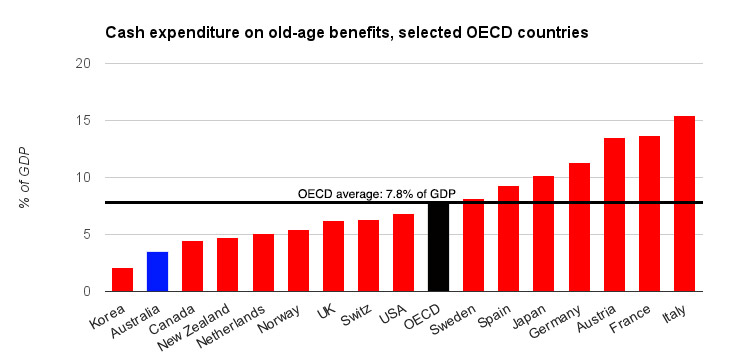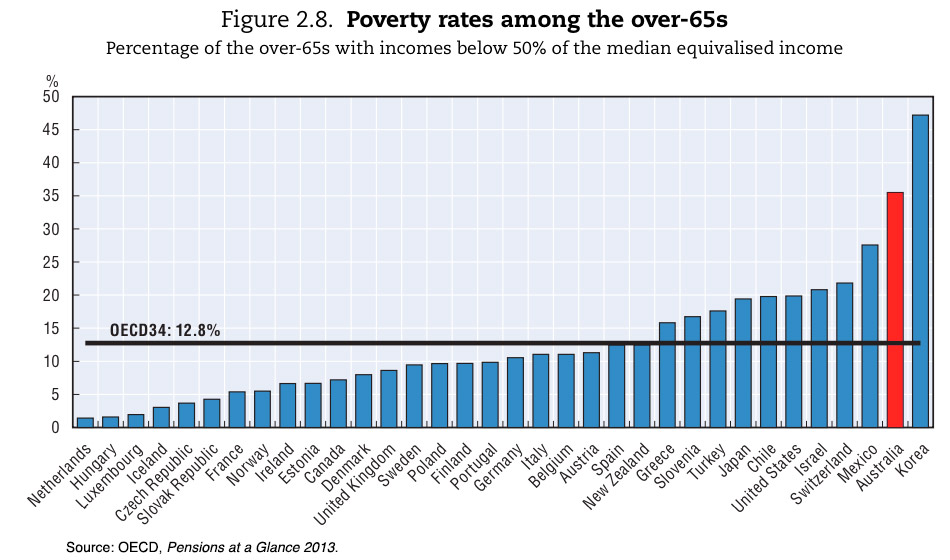Treasurer Joe Hockey has been busy preparing his first budget. It looks like the razor blades are out.
After flagging his intentions in opposition with his infamous speech about the “end of the age of entitlement”, Hockey appears to be hinting at changes to the aged pension.
It’s no secret the government wants to slash public spending. Motivated by a conservative fetish for smaller government, Hockey and Mathais Cormann would prefer to solve Australia’s fiscal deficit by cutting spending, rather than raising taxes. That means attacking government spending in all its forms.
Scientific research appears to be a prominent target, with rumours of big cuts to the CSIRO. But research only accounts for a small proportion of federal expenditure. The really big bikkies are in benefits.
Perhaps that’s why Hockey has this week flagged reforms to the pension. In an interview with the ABC, he suggested the government will move to raise the eligibility age for the aged pension to 70 years. “We’ve got to have a sustainable welfare system,” Hockey told the ABC’s Barrie Cassidy. “It may be the case that my generation has to work for an extra three years.”
Hockey points out that the United Kingdom has moved to raise the pension age to 70. “We need to have a health and welfare system that appropriately deals with the changing demographics of the nation.”
There’s no doubt that Australians are living longer. In the early 1900s, when the pension in Australia was first introduced, life expectancies were in the high 50s. Better public health and nutrition has meant that Australians now enjoy a life expectancy at birth of nearly 82 years (79 for men, 84 for women).
In this context, a gradual rise in the age at which you can access the pension is not unreasonable. And indeed, during Wayne Swan’s tenure as Treasurer, Labor already raised it to 67, although the change will not kick in until the 2020s.
But, as both Labor and the Council on the Ageing have noted, better health and longer lives do not necessarily mean Australians will want to retire later, or indeed will be able to. The increasingly demanding modern workplace is not a very nurturing environment. Most workplaces have few dispensations for workers who fatigue more easily, have eyesight or hearing difficulties, or suffer from mobility issues.
Ian Yates from the Council on the Ageing told the ABC yesterday that “Age discrimination is alive and well, regrettably, in Australia.” Sadly, many older Australians know this only too well from personal experience.
Yates points out that there are 150,000 older Australians on Newstart alone, with hundreds of thousands more on the disability pension, which the Coalition has also made noises about reforming. “Newstart is not liveable,” he told the ABC’s Louise Yaxley, “and we're going to extend that for another three, four, or five years?”
Better health overall doesn’t mean that all are healthier. Many Australians are still working in physically demanding occupations, from contract cleaning, to labouring, to nursing. How realistic is it to expect a male blue collar worker, who has been working in factories and on building sites since he was 15, to work until he is 70?
In any case, does Australia’s aged pension really need reform?
As so often occurs with the Coalition’s scare campaigns on public finances, Hockey’s warnings about the sustainability of the aged pension aren’t backed up by the facts. Australia’s aged pension is far from an unaffordable indulgence. In fact, we have one of the most sustainable public pensions in the western world.
The graph below shows public spending on cash benefits for seniors for a range of rich, western economies.

As you can see, Australia is at the bottom of the table. Australia’s aged pension costs us just 3.5 per cent of Gross Domestic Product, the second lowest in the entire OCED. Only Korea is stingier. Australia’s spending on the aged pension is less than half the OECD average of 7.8 per cent.
Perhaps this is why Australia’s over-65s are, on the whole, a lot poorer than in many other rich countries. The next graph shows poverty levels for seniors in 34 OECD countries.

In this figure, "poverty" is defined as less than 50 per cent of the national median equivalised income. In Australia, this figure is about $22,000 for a single person – an income most of us would agree is pretty basic. (If you need a refresher on what the median equivalised income is in Australia, ACTU economist Matt Cowgill has an excellent explainer.)
Australia has the second highest rate of over-65s poverty in the OECD – more than a third of our older citizens. Again, only Korea fares worse. For every highly-paid CEO retiring with millions of dollars of super, there are dozens of ordinary pensioners struggling to get by on little more than their Centrelink payments. The poverty rate for Australian seniors is nearly three times the OECD average.
If this is the situation now, what will it look like after Joe Hockey and Tony Abbott get out the chainsaw?
The hard truth is that Australia already has a highly-targeted social safety net. On international comparisons, you could even call it miserly. Compared to most advanced economies, we don’t spend vast sums of taxpayers’ money on cash benefits for the needy.
But the Coalition has rarely let facts get in the way of an ideological commitment to smaller government. Unless of course we’re talking about welfare to the less needy – like corporations and high income earners.
Some parts of Australia’s retirement system really are unsustainable and wasteful, such as the roughly $32 billion of superannuation tax concessions handed out by the government last year.
As we’ve noted before at New Matilda, Australia’s super system is amazingly regressive, with the highest income earners paying less tax than the lowest income earners. One estimate – by the Treasury itself – suggests a third of the value of all super tax concessions flow to the wealthiest 10 per cent of the population. The poorest 10 per cent get nothing.
If Joe Hockey wants to look at the sustainability of Australia’s retirement spending, super is the place he should start.
Donate To New Matilda
New Matilda is a small, independent media outlet. We survive through reader contributions, and never losing a lawsuit. If you got something from this article, giving something back helps us to continue speaking truth to power. Every little bit counts.



